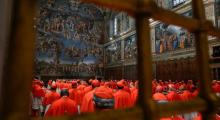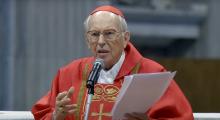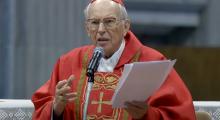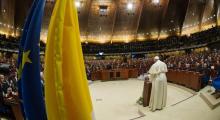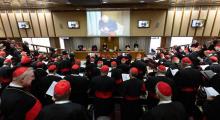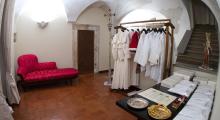Issued by the Catholic Center for Studies and Media - Jordan. Editor-in-chief Fr. Rif'at Bader - موقع أبونا abouna.org
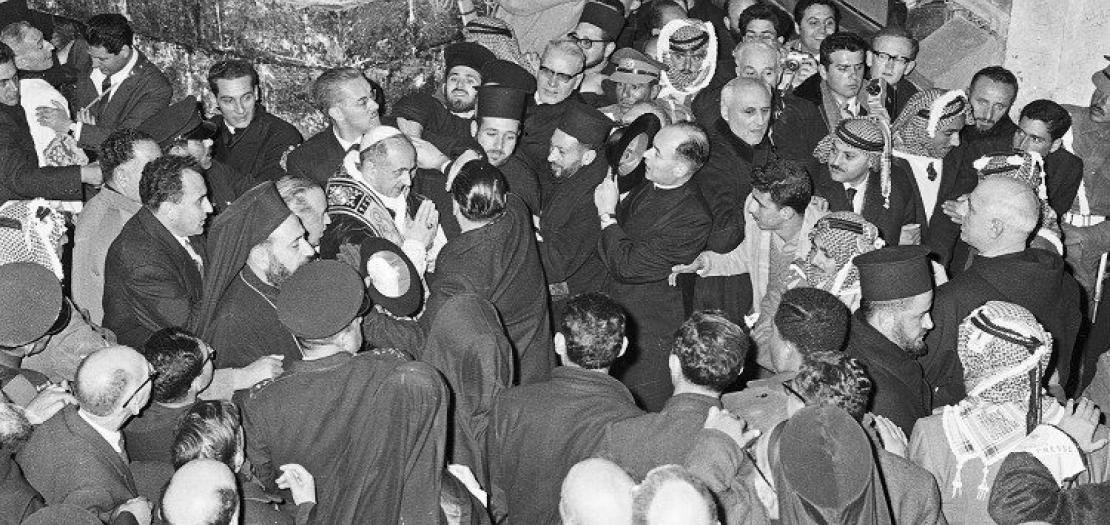
In the intense hours leading up to the beginning of the Conclave convened to elect the new Successor of the Apostle Peter, it is worthwhile to recall a fundamental aspect of the ministry of the Bishop of Rome—one particularly perceived by the People of God: fatherhood. Millions of people, upon the unexpected announcement of the death of Pope Francis, felt orphaned—bereft of a father.
Pope Saint Paul VI reflected on the experience of fatherhood during a conversation with his friend, the philosopher Jean Guitton, upon returning from his journey to India in December 1964. The Pope had been greeted in the streets upon arrival by more than a million people from all religions. It was an unforgettable embrace. The crowds filled the streets, surrounding the open-roofed Lincoln that Paul VI would later donate to Mother Teresa of Calcutta. For two uninterrupted hours, the Pope greeted and blessed the people.
Recalling that encounter with the crowd, Pope Paul VI confided to Guitton, “I believe that of all the dignities of a Pope, the most enviable is fatherhood. I once accompanied Pius XII during solemn ceremonies. He would throw himself into the crowd as into the pool of Bethesda. They clung to him, tore at his garments. And he was radiant. He regained strength. But between witnessing fatherhood and being personally a father, there is an ocean of difference. Fatherhood is a feeling that invades the spirit and heart, that accompanies us every hour of the day, that cannot diminish, but only grows—because the number of children grows.”
Pope Saint Paul VI added, “It is not so much a function as a fatherhood. And one cannot cease being a father... I feel like the father of all humanity... And this feeling, in the Pope’s conscience, is always new, always fresh, always in a state of birth, always free and creative. It is a feeling that does not tire, that does not grow weary, that relieves every fatigue. Never—not even for a moment—have I felt tired when raising my hand to bless. No, I shall never grow weary of blessing or forgiving."
"When I arrived in Bombay," he said, "there were twenty kilometers to travel to reach the Congress venue. Immense crowds, countless, dense, silent, motionless, lined the road—spiritual and poor crowds, those eager, packed, half-clothed, attentive crowds that one sees only in India. I had to continue blessing. A priest friend who was near me—I believe that by the end he was supporting my arm, like Moses' servant. And yet, I do not feel superior, but a brother—less than all—because I carry the weight of all.”
As such, the Successor of Peter is a brother, “less than all,” because he carries the burden of all.
Several months before that experience in India, Pope Paul VI had already felt what it meant to be quite literally “swallowed” by the embrace of the people. This was the case in January 1964, during his first Apostolic Journey, which was to the Holy Land, a visit deeply desired by the late Pope.
In Jerusalem, at the Damascus Gate, the crowd was so immense that it disrupted the planned welcome ceremony. The Pope’s car swayed like a boat, and he, exiting with difficulty and shielded by King Hussein’s soldiers, passed with great effort through the Damascus Gate—his entourage unable to accompany him. Paul VI walked the entire Via Dolorosa, hemmed in by the tightly packed crowd in the ancient alleys of the Holy City. At times, it seemed he would be swallowed up by the throng. His face remained serene and smiling, hands lifted in blessing.
That evening, Father Giulio Bevilacqua, a personal friend of the Pope, told a group of journalists gathered outside the Apostolic Delegation in Jerusalem that many years earlier, Giovanni Battista Montini had confided to him, “I dream of a Pope who lives free from the pomp of the court and the imprisonments of protocol. Finally alone, in the midst of his deacons.”
And therefore, Fr. Bevilacqua concluded, “That is why I am convinced that today, although overwhelmed by the crowd, he is happier than when he descends into Saint Peter’s seated on the gestatorial chair…”


